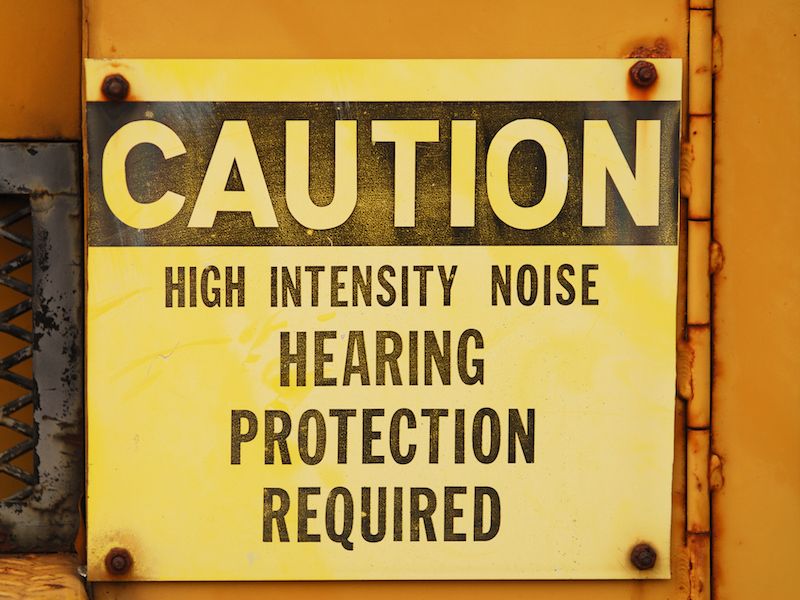
Understanding you need to safeguard your ears is one thing. Knowing when to protect your ears is another matter. It’s more challenging than, for example, knowing when you need sunscreen. (Is the sun out and are you going to be outside? Then you need sunscreen.) Even recognizing when you need eye protection is simpler (Doing some hammering? Working with a saw or dangerous chemicals? Use eye protection).
It can feel as though there’s a huge grey area when addressing when to use ear protection, and that can be detrimental. Unless we have specific knowledge that some place or activity is dangerous we tend to take the easy road which is to avoid the problem altogether.
Risk Assessments
In general, we’re not very good at assessing risk, especially when it comes to something as intangible as permanent hearing damage or hearing loss. Here are some examples to demonstrate the situation:
- A very loud rock concert is attended by person A. The concert lasts roughly 3 hours.
- Person B runs a landscaping company. She spends a considerable amount of time mowing lawns, then goes home to a quiet house and reads a book.
- Person C is an office worker.
You may think the hearing hazard is greater for person A (let’s just call her Ann). Ann leaves the show with her ears ringing, and she’ll spend most of the next day, struggling to hear herself speak. Assuming Ann’s activity was risky to her ears would be fair.
The noise that person B (let’s just call her Betty), is exposed to is not as loud. Her ears don’t ring. So it has to be safer for her hearing, right? Not necessarily. Because Betty is riding that mower every day. Actually, the damage builds up a little at a time even though they don’t ring out. If experienced on a regular basis, even moderately loud noises can have a harmful affect on your ears.
Person C (let’s call her Chris) is even less obvious. Lawnmowers have instructions that emphasize the hazards of long-term exposure to noise. But while Chris works in a quiet office, she has a really noisy, hour-long commute each day on the train. Additionally, while she works behind her desk all day, she listens to her music through earbuds. Is protection something she should think about?
When You Should be Concerned About Safeguarding Your Hearing
The standard guideline is that if you have to raise your voice to be heard, your surroundings are loud enough to do damage to your hearing. And if your surroundings are that noisy, you really should consider wearing earmuffs or earplugs.
If you want to think about this a bit more scientifically, you need to use 85dB as your cutoff. Noises above 85dB have the capacity to cause injury over time, so you should give consideration to using ear protection in those conditions.
Your ears don’t have their own sound level meter to alert you when you get to that 85dB level, so countless hearing specialists recommend getting specialized apps for your phone. You will be capable of taking the correct steps to safeguard your hearing because these apps will tell you when the sound is approaching a dangerous volume.
A Few Examples
Even if you do get that app and take it with you, your phone might not be with you wherever you go. So we might formulate a good baseline with a couple of examples of when to safeguard our ears. Here we go:
- Operating Power Tools: You know that working every day at your factory job is going to call for ear protection. But what if you’re just puttering around your garage all day? Most hearing specialists will suggest you wear hearing protection when using power tools, even if it’s only on a hobbyist level.
- Residential Chores: We already discussed how something as straightforward as mowing the lawn, when done often enough, can call for hearing protection. Chores, like mowing, are most likely something you don’t even think about, but they can cause hearing damage.
- Listening to music with earbuds. OK, this doesn’t require protection but does require caution. Whether your music is going directly into your ears, how loud it’s playing, and how long you’re listening to it are all things you should pay attention to. Noise-canceling headphones are a good choice to prevent needing to turn the volume way up.
- Driving & Commuting: Spending all day as an Uber or Lyft driver? Or perhaps you’re taking a subway after waiting for a while downtown. The constant noise of living in the city, when experienced for 6-8 hours a day, can cause injury to your ears over the long term, especially if you’re cranking up your music to hear it over the commotion.
- Exercise: You know your morning spin class? Or maybe your evening Pilates session? All of these cases could call for hearing protection. The loud volume from trainers who use loud music and microphones for motivation, though it may be good for your heart rate, can be bad for your hearing.
These illustrations may give you a suitable baseline. When in doubt, though, you should choose protection. Compared to leaving your ears exposed to future injury, in most situations, it’s better to protect your ears. If you want to be able to hear tomorrow, protect today.